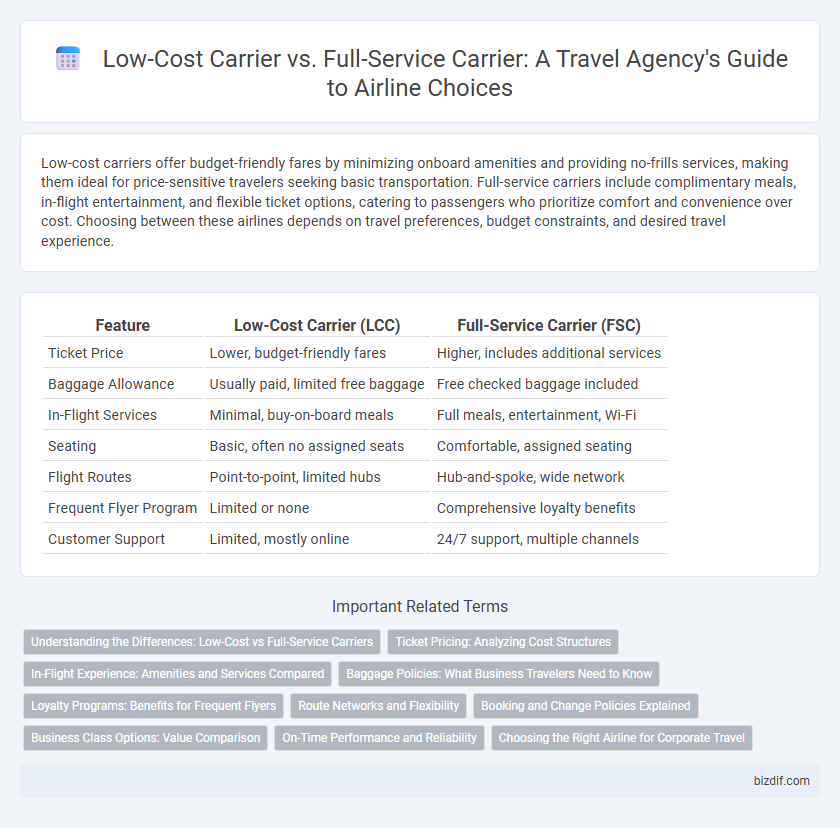Low-cost carriers offer budget-friendly fares by minimizing onboard amenities and providing no-frills services, making them ideal for price-sensitive travelers seeking basic transportation. Full-service carriers include complimentary meals, in-flight entertainment, and flexible ticket options, catering to passengers who prioritize comfort and convenience over cost. Choosing between these airlines depends on travel preferences, budget constraints, and desired travel experience.
Table of Comparison
| Feature | Low-Cost Carrier (LCC) | Full-Service Carrier (FSC) |
|---|---|---|
| Ticket Price | Lower, budget-friendly fares | Higher, includes additional services |
| Baggage Allowance | Usually paid, limited free baggage | Free checked baggage included |
| In-Flight Services | Minimal, buy-on-board meals | Full meals, entertainment, Wi-Fi |
| Seating | Basic, often no assigned seats | Comfortable, assigned seating |
| Flight Routes | Point-to-point, limited hubs | Hub-and-spoke, wide network |
| Frequent Flyer Program | Limited or none | Comprehensive loyalty benefits |
| Customer Support | Limited, mostly online | 24/7 support, multiple channels |
Understanding the Differences: Low-Cost vs Full-Service Carriers
Low-cost carriers prioritize affordable fares by offering no-frills services, charging extra for amenities such as checked baggage, seat selection, and onboard meals. Full-service carriers include these services in the ticket price, providing a more comprehensive travel experience with benefits like lounge access, in-flight entertainment, and flexible booking options. Choosing between low-cost and full-service carriers depends on budget, travel preferences, and the importance of added conveniences.
Ticket Pricing: Analyzing Cost Structures
Low-cost carriers (LCCs) offer significantly lower base ticket prices by unbundling services such as baggage, meals, and seat selection, enabling passengers to pay only for what they use. Full-service carriers (FSCs) include these amenities in their ticket prices, resulting in higher upfront costs but expanded customer perks and flexibility. Analyzing cost structures reveals that LCCs minimize operational expenses through faster turnaround times and secondary airports, while FSCs maintain higher costs due to comprehensive service networks and airport fees.
In-Flight Experience: Amenities and Services Compared
Low-cost carriers typically offer basic in-flight services with minimal amenities, focusing on cost-efficiency by charging extra for extras like meals, seat selection, and entertainment. Full-service carriers provide a more comprehensive in-flight experience, including complimentary meals, beverages, in-seat entertainment, and greater baggage allowances. Passengers seeking comfort and convenience often prefer full-service airlines, while budget-conscious travelers opt for low-cost carriers despite the limited amenities.
Baggage Policies: What Business Travelers Need to Know
Low-cost carriers typically offer lower base fares but have strict baggage policies, often charging extra for checked luggage and even carry-on bags, making it essential for business travelers to budget for these additional fees. Full-service carriers generally include more generous baggage allowances in their ticket prices, providing complimentary checked bags and priority boarding, which can save time and hassle for frequent flyers. Understanding these baggage policies can help business travelers avoid unexpected costs and select the most efficient airline option for their travel schedules.
Loyalty Programs: Benefits for Frequent Flyers
Loyalty programs from full-service carriers often provide frequent flyers with extensive benefits such as priority boarding, lounge access, and complimentary upgrades, enhancing the overall travel experience. Low-cost carriers typically offer simpler loyalty schemes focused on discounted fares or basic rewards, prioritizing affordability over premium services. Frequent flyers seeking added comfort and exclusive perks may find full-service carriers' loyalty programs more valuable for accumulating points and enjoying premium traveler privileges.
Route Networks and Flexibility
Low-cost carriers (LCCs) prioritize point-to-point routes with limited stopovers, offering travelers direct connections mainly between secondary airports, which reduces costs and enhances convenience for budget-conscious passengers. Full-service carriers (FSCs) operate extensive hub-and-spoke networks, providing a broader range of domestic and international routes with numerous connections and flexible scheduling options, catering to business travelers and those seeking premium service. The flexibility of FSCs in rescheduling and route adjustments contrasts with the more rigid schedules of LCCs, which focus on maximizing aircraft utilization and maintaining low fares.
Booking and Change Policies Explained
Low-cost carriers typically offer lower base fares but charge extra for booking flexibility and flight changes, often restricting modifications to within a limited timeframe with applicable fees. Full-service carriers usually include more flexible booking and change policies in their ticket prices, allowing easier cancellations or date changes with lower penalties or free adjustments depending on the fare class. Understanding these differences helps travelers choose the best option for their budget and travel needs while avoiding unexpected costs.
Business Class Options: Value Comparison
Low-cost carriers typically offer limited or no business class services, focusing on affordable fares with basic amenities, whereas full-service carriers provide extensive business class options featuring spacious seating, premium meals, and lounge access that justify higher ticket prices. The value comparison hinges on traveler priorities; budget-conscious passengers prioritize cost savings over comfort, while business travelers seek enhanced convenience and luxury for productivity and relaxation. Evaluating the cost-benefit ratio of business class on full-service airlines versus the minimal offerings or upgrades on low-cost carriers helps travelers choose the optimal carrier for their needs.
On-Time Performance and Reliability
Low-cost carriers (LCCs) often prioritize cost-efficiency, which can lead to higher variability in on-time performance compared to full-service carriers (FSCs). Full-service carriers invest more in operational reliability measures, resulting in consistently better punctuality rates and fewer flight cancellations. Data from the U.S. Department of Transportation shows FSCs average on-time arrival rates around 85%, while many LCCs fluctuate between 75-80%, impacting overall travel reliability.
Choosing the Right Airline for Corporate Travel
Low-cost carriers (LCCs) offer budget-friendly airfare with fewer amenities, making them ideal for corporate trips emphasizing cost-efficiency and short-haul routes. Full-service carriers provide extensive in-flight services, flexible schedules, and loyalty programs that cater to business travelers seeking comfort and reliability on long-haul or international flights. Evaluating factors such as travel budgets, flight duration, company travel policies, and employee comfort preferences ensures the right airline choice for optimizing corporate travel expenses and productivity.
Low-Cost Carrier vs Full-Service Carrier Infographic

 bizdif.com
bizdif.com